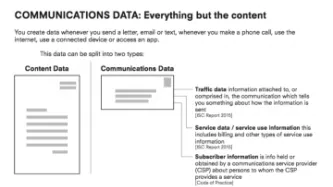Search
Content type: Video
Research by Privacy International revealed some menstruation apps share sensitive personal data, including their user's health data and data about their sexual lives. Christopher Weatherhead - Technology lead at Privacy International - interviews Eva Blum-Dumontet, project manager for "No Body's Business But Mine" about the findings of the research.
Content type: Long Read
In December 2018, Privacy international exposed the dubious practices of some of the most popular apps in the world.Out of the 36 apps we tested, we found that 61% automatically transfer data to Facebook the moment a user opens the app. This happens whether the user has a Facebook account or not, and whether they are logged into Facebook or not. We also found that some of those apps routinely send Facebook incredibly detailed and sometimes sensitive personal data. Again, it didn’t matter if…
Content type: Long Read
A new study by Privacy International reveals how popular websites about depression in France, Germany and the UK share user data with advertisers, data brokers and large tech companies, while some depression test websites leak answers and test results with third parties. The findings raise serious concerns about compliance with European data protection and privacy laws.
This article is part of a research led by Privacy International on mental health websites and tracking. Read our…
Content type: Report
The full report of Privacy International's study on how popular websites about depression in France, Germany and the UK share user data with advertisers, data brokers and large tech companies, while some depression test websites leak answers and test results with third parties. The findings raise serious concerns about compliance with European data protection and privacy laws.
Content type: News & Analysis
This article is part of a research led by Privacy International on mental health websites and tracking. Read our full report.
According to the World Health Organisation (WHO), 25 percent of the European population suffers from depression or anxiety each year, yet about 50% of major depressions remain untreated. This means that everyday thousands of people are looking for information about depression online. They take tests to find out how serious their symptoms are, they try to access…
Content type: Examples
US campaigners supported by the Catholic church are promoting the app Femm, which collects sensitive data about women's sexual lives and aim to scare women from using hormonal birth control, in rural Nigeria. Femm received a $100,000 from the Papal Foundation to promote their app.
https://www.theguardian.com/society/2019/jul/15/femm-menstruation-tracking-app-nigeria-anti-pill-campaignersus-
Author: Jessica Glenza
Publication: The Guardian
Content type: Examples
Following pressure from civil society and pro-abortion groups, Facebook announced on May 8th 208 a ban on foreign ads related to the Irish referendum on abortion. Facebook said they were being consistent with Irish electoral law.
https://www.irishtimes.com/business/technology/facebook-bans-foreign-ads-for-eighth-amendment-referendum-1.3487895
Author: Ciara O'Brien
Publication: Irish Times
Content type: Examples
Una Mullally writes about the online campaign led by the anti-abortion groups Protect the 8th and Undecided8 and their targeting of undecided voters in Ireland. She spoke to Facebook about their role in the spreading of those campaign and to campaigner Gavin Sheridan, who has demanded transparency to control the role of big tech platforms in democratic processes in Ireland.
https://www.irishtimes.com/opinion/the-poisonous-online-campaign-to-defeat-the-abortion-referendum-1.3486236
Author: Una…
Content type: Examples
In this piece Gavin Sheridan, transparency campaigner and CEO of legal intelligence company Vizlegal, argues for the need for a regulatory oversight to control the impact big tech companies and force them to be more transparent.
https://www.theguardian.com/commentisfree/2018/may/13/ireland-abortion-mark-zuckerberg-referendum
Author: Gavin Sheridan
Publication: The Guardian
Content type: Advocacy
On 28 August 2019 PI joined International Privacy Network partner Asociación por los Derechos Civiles and others in writing to the Directors of Public Policy for Latin America at Facebook, Google, and Twitter. The letters outline what steps are needed to make the social media giants' ad archives effective. Earlier this year organisations across Europe, led by the Mozilla, wrote to the companies with similar guidelines - the letters sent today say that equivalent steps should be taken for ad…
Content type: Examples
A 17-year-old Palestinian resident of Lebanon, Ismail B. Ajjawi, was deported shortly after he arrived at Boston Airport, where he was due to start attending Harvard University the following week.
Immigration officers subjected him to hours of questioning — at one point leaving to search his phone and computer — according to a written statement by Ajjawi. According to the student, his visa was revoked because of content posted by some social media contacts.
The student alleges that…
Content type: News & Analysis
The Irish Data Protection Commissioner has made a ruling on the controversial Public Services Card (PSC) that has described much of what is is done with the card as unlawful. The PSC has proven controversial: introduced in 2012 for welfare claimants, it's use expanded to more and more uses, including its use to get a driving licence or passport. Now, following campaigns from civil liberties organisations, this expansion of use has now been found to be unlawful by Ireland's Data Protection…
Content type: Long Read
It is common ground that bulk collection of content would be a deprivation of the right to privacy. That is an inexcusable or unjustifiable step too far. Repeatedly the Government whether in litigation or legislating, has emphasised that they are not taking content in bulk. Content is the forbidden ground.
This has resulted in the Government seeking to explain, for example, what parts of an email would constitute content and meta data. Within the Investigatory Powers Act it has led to the…
Content type: Report
To develop our framework for researching and challenging problematic aspects of social benefits systems, we sought to assemble a set of readings to provide greater context for understanding the history of surveillance and social benefits systems, the role social benefits systems play in increasing surveillance of particular communities, how to challenge problematic aspects of such systems, and how to conceive of affirmative solutions for what truly equitable and just social protection could…
Content type: Long Read
This blog is about our new Twitter bot, called @adversarybot. If you want to follow the account, please do watch the pinned 'Privacy Policy' tweet before you do so.
Content type: News & Analysis
The Watson/Tele2 decision of the CJEU concerned section 1 and 2 of DRIPA and the Data Retention Regulations 2014. This contained the legislative scheme concerning the power of the Secretary of State to require communications service providers to retain communications data. Part 3 of the Counter-Terrorism and Security Act 2015 amended DRIPA so that an additional category of data - that necessary to resolve Internet Protocol addresses - could be included in a requirement to retain…
Content type: Advocacy
RESPONSE OF PRIVACY INTERNATIONAL TO THE CONSULTATION ON THE GOVERNMENT’S PROPOSED RESPONSE TO THE RULING OF THE COURT OF JUSTICE OF THE EUROPEAN UNION ON 21 DECEMBER 2016 REGARDING THE RETENTION OF COMMUNICATIONS DATA
[Full response below]
Introduction
The consultation is in response to the judgment in Tele2 Sverige AB v Post-och telestyrelsen (Case-203/15) and R (Watson) v Secretary of State for the Home Department (Case C-698/15) [“Watson judgment”].
The case concerned…
Content type: Explainer
In 2000, the Government told Parliament that the Regulation of Investigatory Powers Act 2000 (RIPA) was the total extent of surveillance powers that were needed. However, within weeks of RIPA receiving Royal Assent, a report from UK law enforcement was leaked, stating that the power the Government truly wanted was companies to retain communications data on all their users.
Immediately after 9/11 as governments around the world over-reached with new pieces of…
Content type: Long Read
Six years after NSA contractor Edward Snowden leaked documents providing details about how states' mass surveillance programmes function, two states – the UK and South Africa – publicly admit using bulk interception capabilities.Both governments have been conducting bulk interception of internet traffic by tapping undersea fibre optic cables landing in the UK and South Africa respectively in secret for years.Both admissions came during and as a result of legal proceedings brought by Privacy…
Content type: Examples
A February 2019 study of facial recognition systems found that these systems are not designed with transgender and nonbinary people in mind. Researcher Os Keyes studied 30 years of facial recognition research, including 58 separate research papers, and found that more than 90% of the time researchers followed a binary gender model, more than 70% of the time viewed gender as immutable, and, in gender-specific research, more than 80% of the time viewed gender as a purely physiological construct.…
Content type: Examples
In 2018, Brian Hofer, the chair of Oakland's Privacy Advisory Commission, filed suit after police wrongfully stopped him at gunpoint because their automated license plate recognition system, supplied by Vigilant Solutions, indicated that the rental car he was driving had been stolen. The car had in fact been stolen some months earlier, but been recovered. Despite such errors, police claim that the technology has helped reduce crime, identify stolen vehicles, and identify and arrest suspects.…
Content type: Examples
In 2018, to prove how easily soldiers' real-world actions can be manipulated via social media, researchers at NATO's Strategic Communications Center of Excellence (StratCom) conducted a red-team exercise in which they "catfished" members of the armed forces. Using information collected from Facebook profiles and people search websites, the researchers created targeted advertising to draw soldiers to phony Facebook pages mimicking those service members use to connect with each other. In the…
Content type: Examples
In February 2019, after investigative journalists used social media posts to investigate the country's hidden role in conflicts such as those in Ukraine and Syria, Russia began moving to ban its soldiers from posting any information that would expose their whereabouts or their role in the military. The ban would include photographs, video, geolocation data, and other information, and prohibit soldiers from sharing information about other soldiers and their relatives.
https://www.reuters.com/…
Content type: Examples
In 2018, repossession services in the US were experiencing a boom in business as the number of Americans failing to keep up with their car payments reached its highest point since 2012. One of these, Ohio-based Relentless Recovery, was increasing its hit rate by equipping its agents' vehicles with cameras to help it build a database of every license plate in the state along with the locations where the vehicles may be easily found. Repo agents collect most of the billions of license plate scans…
Content type: Examples
In February 2019, the UK Home Office told the Independent Chief of Borders and Immigration that it was planning to build a system that could check and confirm an individual's immigration status in real time to outside organisation such as employers, landlords, and health and benefits services. Lawyers and human rights campaigners expressed concerns that the project had received no scrutiny or public discussion, and that the Home Office's record suggested the result would be to unfairly lock…


















